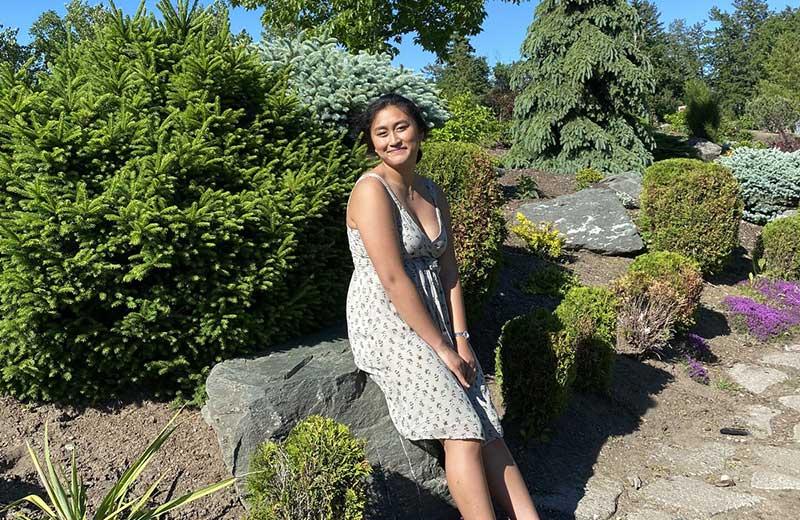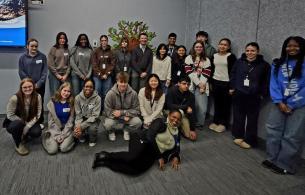As the COVID-19 vaccines continue to be distributed in Northern BC, it's important to consider who has helped get us to this point.
Many student nurses have taken on the difficult task of beginning their practical work during a global pandemic. Bearing the stress of the pandemic while honing skills they’ll be using for the rest of their careers requires true dedication.
Jayne Roa, who has just completed the third year of her university nursing program and is working as an employed student nurse (ESN) in Terrace, is one example.
Working as a student nurse
“In school you’re taught this blueprint,” she says. “But then, when you actually go out and you’re in your clinical placements, you feel like, ‘Wow, this is completely different from what we learned.’ It’s similar, I would say, but you have to make your own personal adjustments.”
Student nurses like Jayne spend years working in hospitals and clinics applying what they’ve learned in class.
“And that’s really cool, because you’re not practicing on dummies; these are real people with completely unique problems and issues and you have to do a lot of problem-solving,” says Jayne.
Working alongside fully practicing nurses also allows students to gain more insight into their field.
“I think that the biggest difference is that practicing nurses, they’re actually working, and they have that knowledge to be [able to work] alone,” says Jayne. “They have the independence and that competency that student nurses are working to build to.”
During their schooling, student nurses are given clinical placements which allow them to put their new knowledge to work in a practical setting. These take place during school semesters, and also help provide assistance to hospitals and clinics.
Jayne’s clinical placements were mainly at the University Hospital of Northern British Columbia (UHNBC) in Prince George, where she primarily cared for patients on the medicine and surgery wards. Like other third-year nursing students, she assessed patients, administered medications, and provided any needed care for her patients.
In addition to clinical placements, student nurses can apply for ESN positions after completing their second or third year of nursing education. ESN positions employ student nurses in patient care areas during the summer, providing additional practical experience. Students can choose an area to specialize in, allowing them to work with specific types of patients. Specialties include acute care, maternity, mental health and addictions, and more. In these positions, student nurses are supervised by a preceptor (a fully qualified nurse) in a practical setting. This helps them strengthen the skills they’ve been taught in school.
Working in other areas
After their second year, most student nurses receive their diploma, plus a BC Care Aide and Community Health Worker Registry number, allowing them to work as a care aide or community health worker.
“Care aiding is interesting because there are lots of opportunities where people who aren’t technically care-aide-certified can apply,” says Jayne. “That’s how I got my care aiding job, because I have the skillset I need for care aiding.”
As a care aide, Jayne was required to go to people’s homes and help them with tasks they weren’t able to perform on their own. This included helping patients shower, helping with medications, and sometimes making meals for them. The pandemic has created an increased demand for care aide positions, making this a popular choice for many student nurses.
Trying to create some positivity
“I like the whole idea of being able to help people. I think that most jobs do that, whether it be indirectly or directly,” she explains. “I like nursing because it’s so personal. I do enjoy talking to people and interacting with them, and then building that rapport or relationship with a person and seeing them do really well. It makes people happy, and I think that’s really great to see – some sort of positivity.”
Jayne has been interested in nursing since she was a child. As she grew older, she began to appreciate the versatility that a nursing career offers, such as the range of possible positions with different duties and responsibilities in varying locations. Her passion for caring for others, the freedom that she finds in her job, and the ability to provide positivity in her role all motivate her as a student nurse.
Working and studying during COVID-19
For Jayne, the COVID-19 pandemic has added an extra layer of stress.
“It’s this weird impending thing that everybody knows is there and everyone is on guard for,” she says.
She adds that not being able to attend classes in person has been challenging. The lack of social interactions and hands-on experience has been difficult to adapt to and has created various barriers.
However, as always, Jayne is able to look on the bright side of life.
“It’s shown me how to be more independent in terms of studying,” she says, “I think independence in learning is really valuable.”
Jayne also describes how cleanliness and wearing proper PPE (personal protective equipment) have been emphasized and helped drive home the reasons why you don’t want anyone, including yourself, to get sick.
She also believes that the pandemic has loosened some of the stigma around vaccines, creating an opportunity for people to learn more about them.
What it’s all about
“I think that nursing is really difficult, but in a rewarding way,” she says. “It’s not just your own personal emotions that you’re dealing with, but you have to help the patient get through that as well with their family.”
Jayne feels that nursing isn’t solely about being able to give medication or dress a wound, but also requires person- and family-centred care and an overall support system for each patient. The various specialties of nursing then require each nurse to personalize their care to each patient and their struggles.
“But at the end of the day that’s what nursing is all about: providing care to your patients and basically helping them through whatever they’re going through,” Jayne says. “And that’s how I generally think of it, as a very rewarding profession that you have to be very caring to do.”
For more information
For details on the ESN program, visit Northern Health’s Employed Student Nurse page.














Comments